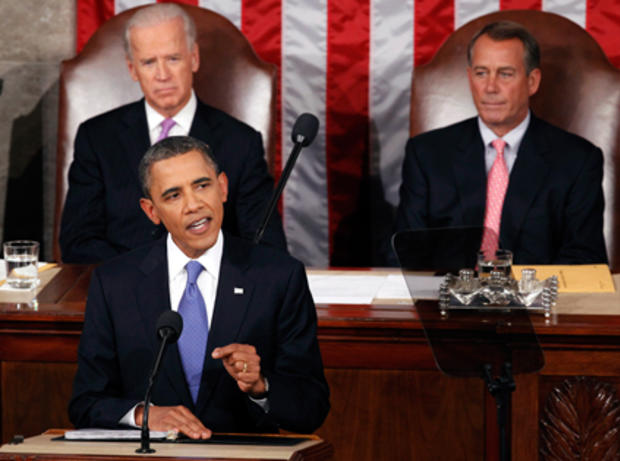Deficit concerns loom over Obama's jobs package
In a speech before a rare joint session of Congress on Thursday night, President Obama called on Congress to act immediately on a $447 billion economic plan to jump-start the economy. But in a nod to Republicans who say the economy can't recover under the weight of growing deficits and debt, the president said he'll keep deficit reduction near the top of his agenda.
"We can reduce this deficit, pay down our debt, and pay for this jobs plan in the process," Mr. Obama said. "But in order to do this, we have to decide what our priorities are."
Mr. Obama said that a week from Monday, he'll release an ambitious deficit plan -- "a plan that will not only cover the cost of this jobs bill, but stabilize our debt in the long run."
The president said he had a plan for more spending cuts -- on top of the spending cuts he's already signed into law as part of the debt ceiling deal -- and a plan to make modest adjustments to Medicare and Medicaid. He also said he'd call for tax reforms that would ensure the wealthiest Americans and the biggest corporations "pay their fair share."
Some liberals, and at least one Republican, sounded a note of alarm after hearing the president's remarks on the popular government health care programs.
"I worry a little bit about what he's going to do for Medicare, Medicaid," Democratic Rep. Maxine Waters of California told CBS News' Scott Pelley in an interview on CBSNews.com immediately following the speech. She added, "Of course, the devil is in the details."
Obama unveils $447B jobs plan
Video: Rep. Waters on Obama's jobs plan and black unemployment
Video: Cantor on Obama's speech: A lot that we can agree on
The Progressive Change Campaign Committee (PCCC), a liberal grassroots group that has often taken on the president, said Mr. Obama was in essence asking Congress to pay for corporate tax cuts (more than half of Mr. Obama's plan is tax cuts for both working Americans and businesses) with cuts to Medicare benefits.
"Forcing Americans to choose between jobs and Medicare is unthinkable, especially for a Democratic president," PCCC said in a statement. "America needs a massive government investment in jobs - not Medicare benefit cuts, not corporate tax giveaways, and not telling the unemployed to work for big corporations for free."
Freshman Republican Rep. Bill Huizenga of Michigan also criticized the president's plan to modify Medicare and to slash the payroll tax, which pays for Social Security and Medicare.
"We need to understand that there's long-term ramifications in the Social Security and Medicare, which are dedicated funds, that those payroll deductions go to," Huizenga said Thursday night, CBS News Capitol Hill Producer Jill Jackson reported. "We can't eat our cake and eat it too on this. We can't be complaining that Social Security is underfunded and then do additional things to continue that under funding."
Mr. Obama acknowledged that many, especially in his party, are opposed to changes to Medicare or Medicaid that would potentially lower benefits. He said, however, that they have to face the "truth."
"If we don't gradually reform the system while protecting current beneficiaries, it won't be there when future retirees need it," he said. "We have to reform Medicare to strengthen it."
At the same time, Mr. Obama said that Republicans must acknowledge the truth about taxes.
Obama's message: "Pass this jobs bill"
Text of President Obama's jobs speech
Obama's Speech: What are the Best Policies to Help the Unemployed?
Obama Jobs Plan: Some Worthy Ideas, but It Won't Turn the Tide
"While most people in this country struggle to make ends meet, a few of the most affluent citizens and corporations enjoy tax breaks and loopholes that nobody else gets," he said. "We need a tax code where everyone gets a fair shake, and everybody pays their fair share."
Though the president has promised to lay out long-term deficit plans next week, Republicans on Thursday night criticized the president for "passing the buck," as GOP Sen. Pat Toomey put it, on finding ways to pay for his newly-unveiled $447 billion jobs plan.
That's because Mr. Obama said he would ask the newly-formed congressional "super committee" to formulate a plan to pay for his economic proposals.
The "super committee" was formed as part of a deal to raise the debt ceiling, and the bipartisan group of 12 is already tasked with finding $1.5 trillion in federal budget savings by Thanksgiving. Its initial task is challenging enough, so it's unclear whether they could ramp up their mission to pay for the president's plan.
Republican Rep. Jeb Hensarling of Texas, one of the co-chairs of the group, essentially rejected the president's request.
"His proposal would make the already-arduous challenge of finding bipartisan agreement on deficit reduction nearly impossible, removing our options for deficit reduction for a plan that won't reduce the deficit by one penny," Hensarling said in a statement following Mr. Obama's speech. "It's not the role of this committee to spend more money we don't have on jobs we don't get."
Other GOP members of the "super committee" gave similar responses. "Good speeches and more deficit spending won't get Americans back to work," Sen. Rob Portman of Oregon said. "What's worse, it appears President Obama is once again abdicating responsibility in paying for his plans, pushing it off on the Deficit Reduction Committee."
Sen. Jeff Sessions of Alabama -- the top Republican on the Senate Budget Committee, though not a member of the deficit "super committee" -- also said in a statement that "saying that something is 'paid for' isn't enough."
"Borrowing even more to spend immediately in exchange for vague promises of distant future cuts means that we are digging ourselves into a deeper fiscal hole and moving quickly in the wrong direction," he said.
